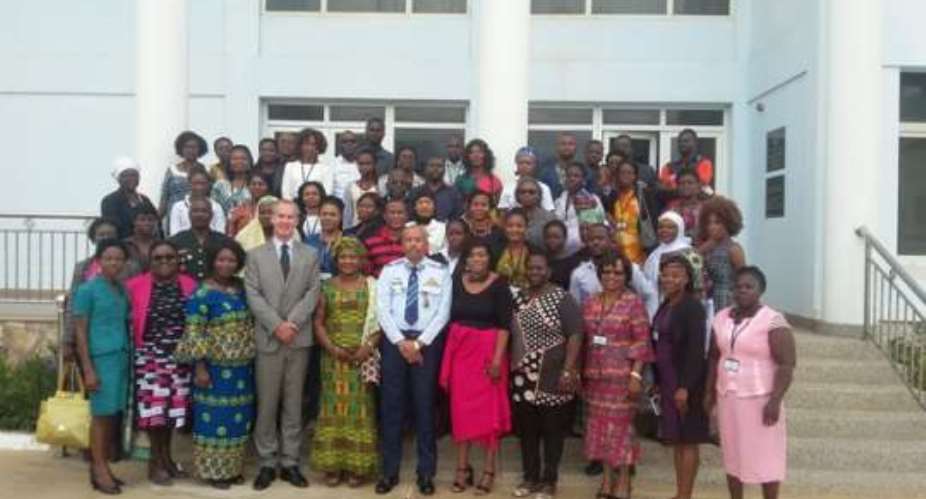By Kwamina Tandoh, GNA
Accra, Aug. 25, GNA - A three-day training workshop on Special Gender Sensitive and Women Focused Election Observation in the context of Ghana's election 2016 has ended in Accra.
The maiden edition of the workshop is being organised by the Women, Peace and Security Institute of the Kofi Annan International Peacekeeping Training Centre (KAIPTC).
The project will be implemented within the framework of the Women, Peace and Security Communication Network (WPSCommNET).
The training aimed at equipping the members of the WPS CommNet and other participants with the skills and tools necessary tools to undertake domestic election observation with a gender lens, paying particular attention to women parliamentary candidates in their various constituents over the 2016 electoral cycle.
Air Vice Marshal Griffiths Santrofi Evans, Commandant of the KAIPTC said the workshop, aimed at contributing to a better understanding of the dynamics and factors that affect women's political participation and help to identify the gaps and challenges that have implications for their success or otherwise in the political and public spheres.
He said women account for less than 15 per cent of the country's legislative governance and their numbers seem to be dwindling as the Ghanaian democracy had gained in traction and ascendency.
He observed that whereas women accounted for an estimated 20 per cent of parliamentary seats in the first republic, they currently occupy less than 10 per cent of the seats in the current legislature.
'This far below the minimum 30 per cent threshold recommended by the UN, the low number of women in parliament can have implications for legislation that adequately reflects their interest and priorities', he added.
Air Vice Marshal Evans noted that affording women greater access and representation in politics and governance would allow their potentials and perspectives to be brought bear on the process of democracy and thereby maximise the benefits thereof.
He said having more women in leadership could positively affect the standard of living and sustainability of development.
He quoted Dr Kofi Annan, Former Secretary General of the UN as saying 'there is not tool or development more effective than the empowerment of women, no other policy is as likely to raise economic productivity, no other policy powerful in the chances of education for the next generation''.
He added that the workshop would go a long way to boosting support for the full implementation of the global agenda of women's empowerment and greater participation in leadership and decision-making at all levels of the society.
Mr Andrew Barnes, Australian High Commissioner to Ghana said promoting gender inclusive participation at all stages of the electoral system forms an integral part of democratic process.
He reiterated Australia's commitment to help promote women's representation and participation in leadership and governance.
Women Organisers of the various political parties charged women to defy all odds that hamper their effective role in decision making and leadership.
GNA





 Former Kotoko Player George Asare elected SRC President at PUG Law Faculty
Former Kotoko Player George Asare elected SRC President at PUG Law Faculty
 2024 elections: Consider ‘dumsor’ when casting your votes; NPP deserves less — P...
2024 elections: Consider ‘dumsor’ when casting your votes; NPP deserves less — P...
 You have no grounds to call Mahama incompetent; you’ve failed — Prof. Marfo blas...
You have no grounds to call Mahama incompetent; you’ve failed — Prof. Marfo blas...
 2024 elections: NPP creates better policies for people like us; we’ll vote for B...
2024 elections: NPP creates better policies for people like us; we’ll vote for B...
 Don’t exchange your life for wealth; a sparkle of fire can be your end — Gender ...
Don’t exchange your life for wealth; a sparkle of fire can be your end — Gender ...
 Ghana’s newly installed Poland train reportedly involved in accident while on a ...
Ghana’s newly installed Poland train reportedly involved in accident while on a ...
 Chieftaincy disputes: Government imposes 4pm to 7am curfew on Sampa township
Chieftaincy disputes: Government imposes 4pm to 7am curfew on Sampa township
 Franklin Cudjoe fumes at unaccountable wasteful executive living large at the ex...
Franklin Cudjoe fumes at unaccountable wasteful executive living large at the ex...
 I'll 'stoop too low' for votes; I'm never moved by your propaganda — Oquaye Jnr ...
I'll 'stoop too low' for votes; I'm never moved by your propaganda — Oquaye Jnr ...
 Kumasi Thermal Plant commissioning: I pray God opens the eyes of leaders who don...
Kumasi Thermal Plant commissioning: I pray God opens the eyes of leaders who don...
